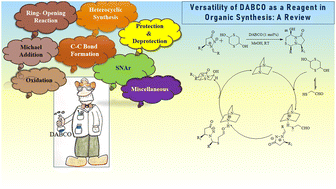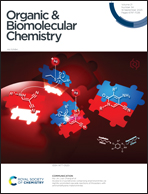The versatility of DABCO as a reagent in organic synthesis: a review
Abstract
DABCO (1,4-diazabicyclo[2.2.2]octane) has garnered a lot of interest for numerous organic transformations since it is a low-cost, environmentally friendly, reactive, manageable, non-toxic and basic organocatalyst with a high degree of selectivity. Moreover, DABCO functions as a nucleophile as well as a base in a variety of processes for the synthesis of a wide array of molecules, including carbocyclic and heterocyclic compounds. Protection and deprotection of functional groups and the formation of carbon–carbon bonds are also catalyzed by DABCO. The reagent also finds applications in the synthesis of functional groups like isothiocyanate, amide and ester. Application of DABCO in cycloaddition, coupling, aromatic nucleophilic substitution, ring-opening, oxidation and rearrangement reactions is also noteworthy. This is a state of the art review that has encompassed a variety of processes for the synthesis of organic frameworks using DABCO.



 Please wait while we load your content...
Please wait while we load your content...